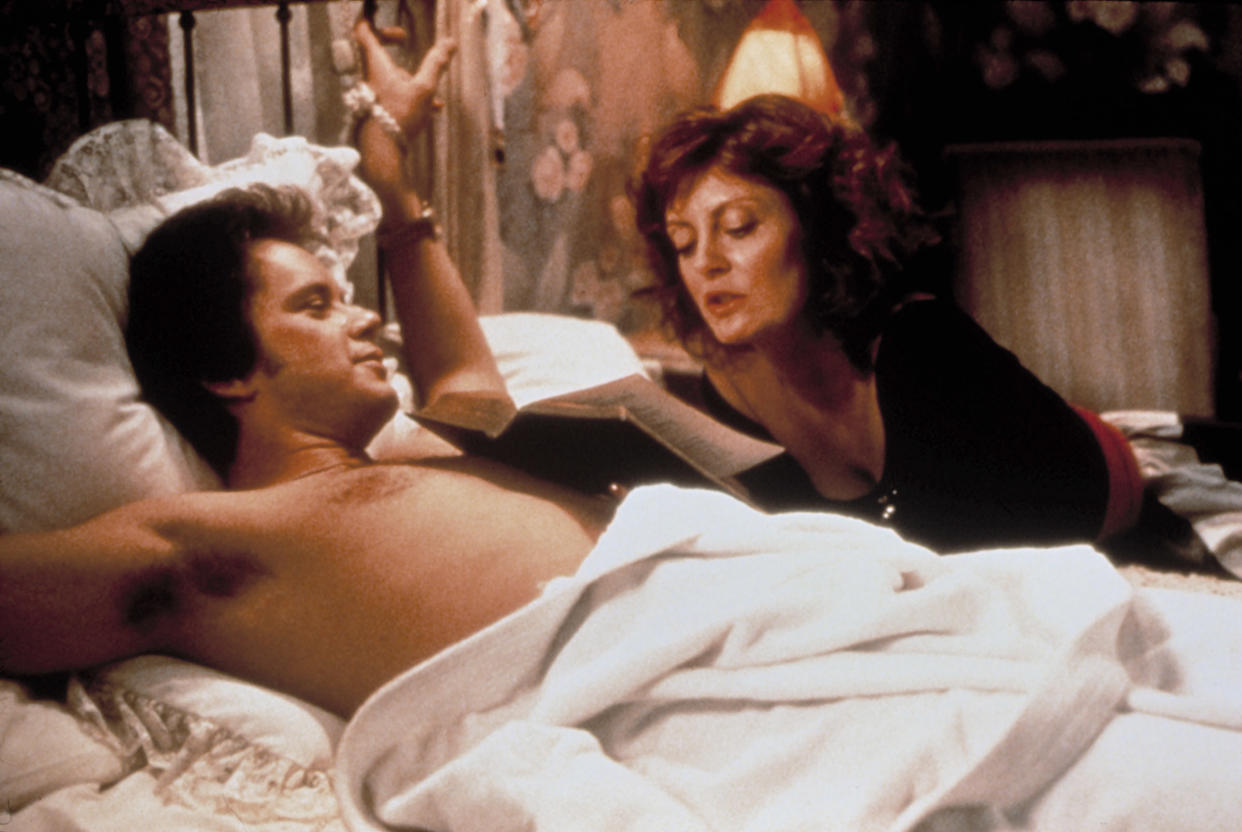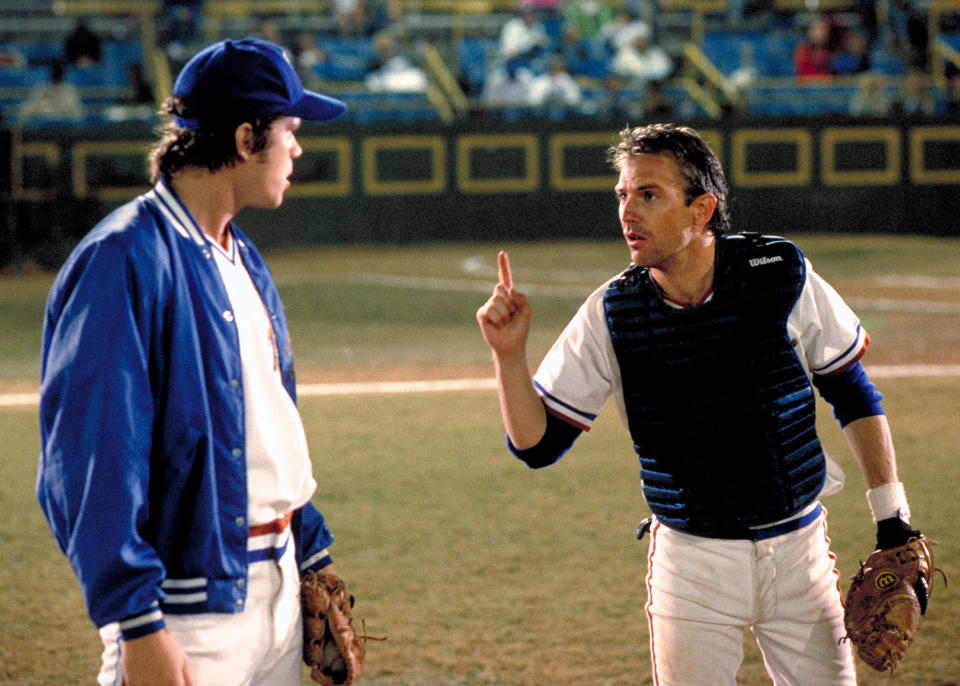30 years ago, 'Bull Durham' made us believers in the Church of Baseball

The Church of Baseball houses many movies that are worthy of worship, from 1976’s The Bad News Bears to 2011’s Moneyball. But if you’re looking for a single film that bears the touch of divine inspiration, the answer has to be Ron Shelton’s Bull Durham, which stole moviegoers’ hearts upon its release 30 years ago today on June 15, 1988. Three decades later, this major- league story of a minor-league team remains unique among baseball favorites in the way it studiously avoids such conventional genre trappings as the “big game” climax or the “one last shot at redemption” arc for a washed-up player.
Instead, Shelton lasers in on the daily grind of playing Single-A ball and all the drama (and comedy) that entails. “One of the reasons I wrote the movie was to show the players’ point of view, which is very different from the fans’ point of view,” the writer-director told Yahoo Entertainment last year. As evidence of how that point of view manifests itself in the movie, Shelton pointed to the famous sequence where the Durham Bulls collectively congregate on the mound for an impromptu discussion about many things, from how to un-curse a glove to the proper wedding present.
“What goes on at the mound may not be as comically absurd as that scene, but it’s never exactly what you think it is from the stands either,” Shelton said. “Guys are not up there saying, ‘Throw a low slider away to bring him in.’ Nobody wanted me to shoot that scene, and when I did, they asked, ‘Why is this still in the movie?’ I said, ‘Let’s see what the audience says,’ and from the first test screening on, it was the audience’s favorite scene.”
Kevin Costner, who played Minor League lifer Crash Davis, told Yahoo Entertainment he was onboard from the moment he saw Shelton’s screenplay, but Hollywood was a tougher sell. “When I read that script, I knew it was great. The problem was we couldn’t get anybody to make that,” Costner said during a Role Recall session. Shelton, Costner said, “took it around to the studios twice, and everybody rejected it. There was a moment both him and I had to say, ‘I guess nobody is going to make this.’ And we wound up making it for like $6 million.”
The film went on to become a big hit, earning Shelton an Oscar nomination for best screenplay, and was hailed for its accurate portrayal of life in the minors, which Shelton had experienced firsthand. Aside from the mound chatter, another notable way that Bull Durham preserves the players’ point of view is by not being particularly concerned about big innings or final scores. Fans obsess about standings and statistics from their bleacher seats, but on the field, RBIs, double plays, and 3-2 counts blend into one long game. That’s especially true for journeymen players like Costner’s seen-it-all catcher Crash for whom baseball is no longer a career, but merely a job. A 21-day veteran of the majors, Crash’s never-ending tour of far-flung Minor League towns has deposited him in Durham, N.C., where he’s expected to both catch for and coach local pitching star, Nuke LaLoosh (Tim Robbins) — renowned for his “million-dollar arm and 5-cent head.” True to their nicknames, Nuke is on his way up and Crash is on his way down, requiring multiple failed attempts to meet each other somewhere in the middle.

Costner and Robbins were only three years apart in age when they made Bull Durham, and that puts a different spin on the familiar mentor-pupil dynamic. To anyone not in the baseball world, Crash is objectively a young man, but he carries himself like a guy in his early 60s rather than his early 30s because that’s the age he and his teammates see. Meanwhile, Nuke’s toddlerlike blowups on and off the mound make him seem younger than his years. Even though Crash is the nominal adult in their partnership, pride and envy keep him from fully embracing that role. In another memorable scene — and one that Shelton considers his personal favorite — Crash gives in to his juvenile side by arguing with an umpire until he gets thrown out of the game.
The push-pull between age and maturity is territory that Shelton has often revisited, both in subsequent sports movies like White Men Can’t Jump and Tin Cup, as well as his more recent action comedies Hollywood Homicide and Just Getting Started. This tension is most fully realized in Bull Durham, though, because of how it factors in Crash and Nuke’s relationship with the film’s most memorable character: Annie Savoy (Susan Sarandon). Strictly speaking, Annie would seem to provide the perspective of the baseball fan that Bull Durham isn’t intended to reflect. But she has found a unique way to parlay her devotion to the game into being an adjunct member of the team. Every season, she picks one Bulls player to receive extracurricular coaching sessions, which are derived from her theory that baseball and sex are, essentially, the same sport.
Since Annie’s lesson plans include minicourses on patience (sample homework: bedtime readings of Emily Dickinson or Walt Whitman poetry as foreplay) and listening to one’s body (sample homework: wearing garters under a uniform), they go over well with wide-eyed adolescents like Nuke, who have delayed developing grownup opinions. Crash, however, has an established list of entrenched beliefs, which he recites in a cinematic soliloquy for the ages.
What Crash does eventually learn from Annie — and what she learns from him — is that even adults have to stop playing games, whether in baseball or romance. In that way, Bull Durham is one of the few sports movies that endorses the idea of walking off the field with dreams unrealized. Crash can boast about breaking the Minor League career home-run record, but there are no light-shattering blasts or game-winning first-base dashes to put him in the history books. Meanwhile, Annie helped transform Nuke into the Major Leaguer he eventually becomes, even though her name will almost certainly be omitted from his autobiography. Baseball will go on without either Crash or Annie, and that’ll have to be OK. It’s a half-melancholic, half-happy ending that Shelton tellingly didn’t repeat for his reunion with Costner in Tin Cup, where the hero suffers defeat, but still ultimately has his game — in that case, golf— to fall back on.
“What resonates in Bull Durham is that these two people are at a turning point in their lives,” Shelton told us. “Annie’s the diva of her own opera; she’s built this world that’s glorious, but it’s got a shelf life. And Crash has got his own dilemma: How long can he keep playing a boy’s game when it’s not loving him the same way he loves it?” Thankfully, we don’t have that same dilemma: Far from having a shelf life, the divine wit and wisdom of Bull Durham remain easy to love at any age.
Bull Durham is available to stream for free on Amazon Prime; it can also be rented or purchased from iTunes, Vudu, and YouTube.
Read more from Yahoo Entertainment:


